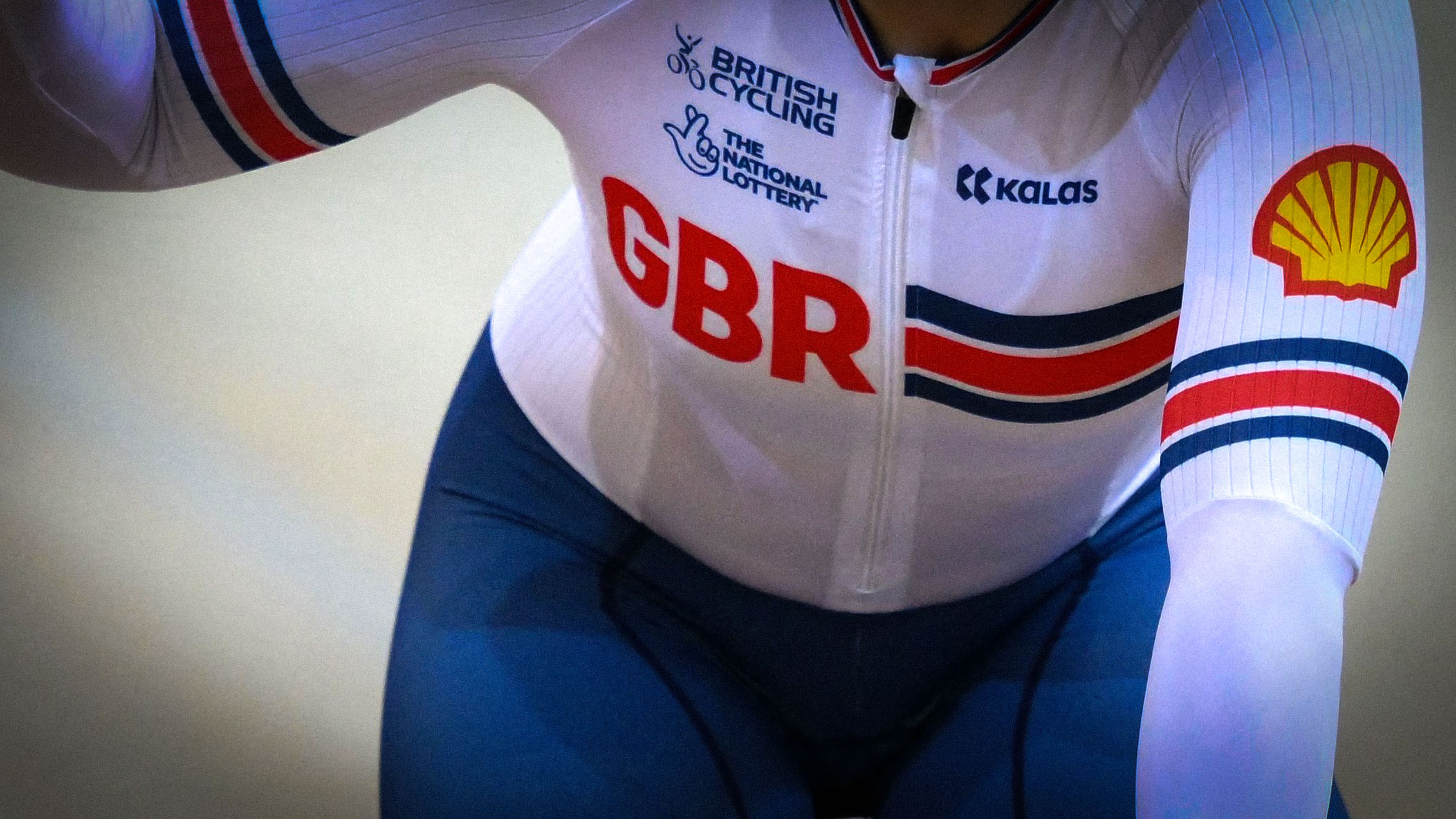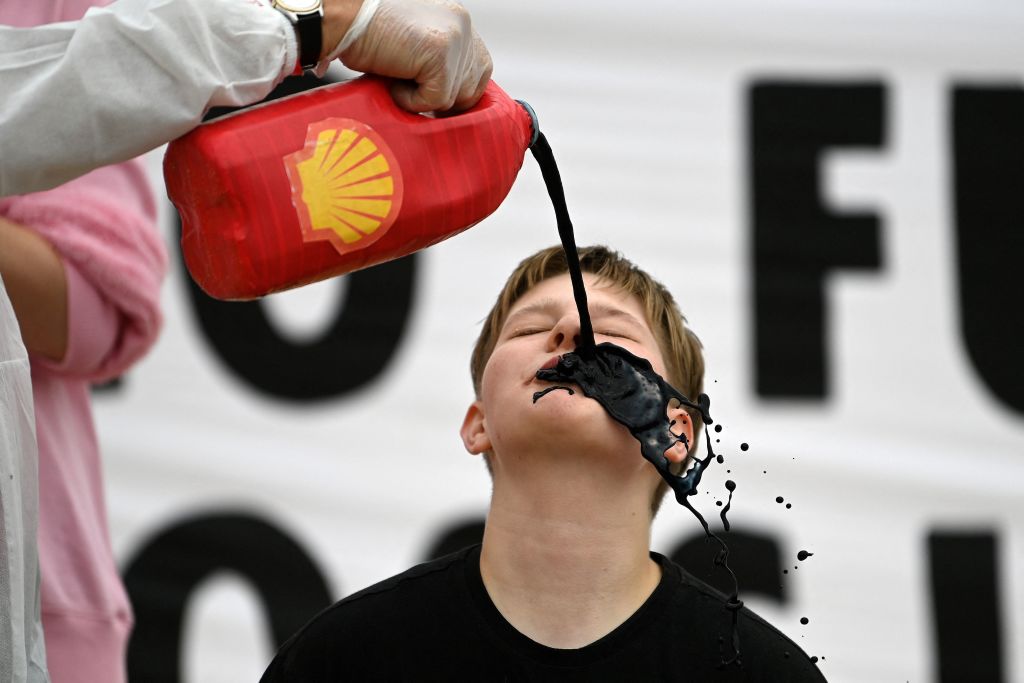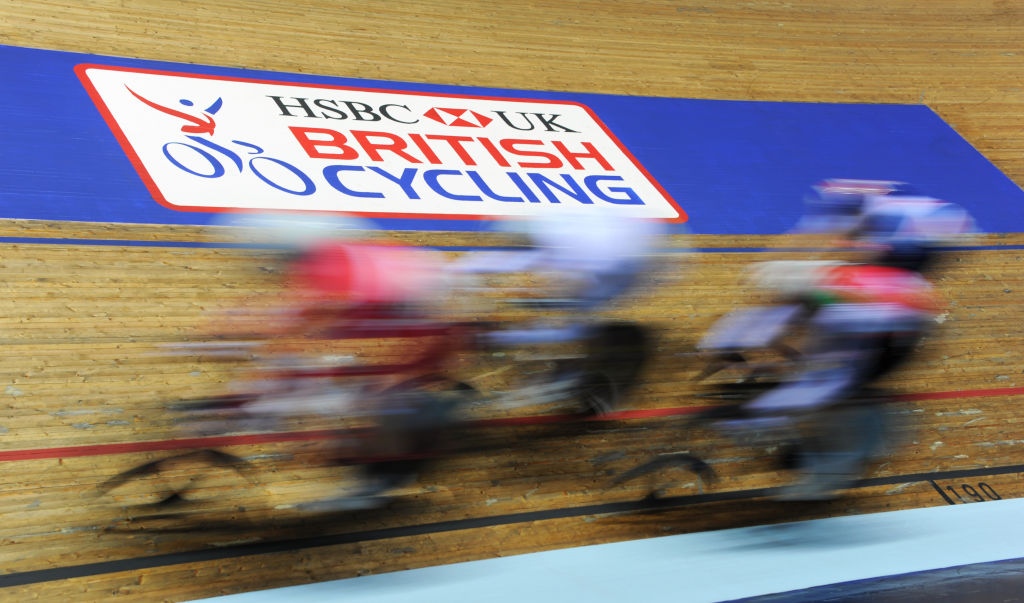'Shaking hands with the Devil' – Inside British Cycling's controversial deal with Shell
A reputation damaged and a financial black hole unfilled

"Sustainability has to be an underlying principle for us, whether we are viewing it from the perspective of profit, people and planet, as the three are inextricably linked": Brian Facer, CEO of British Cycling, Annual Report 2021-22
October 10 started like any old Monday in the office at the National Cycling Centre in Manchester. Staff checked emails, chatted about the weekend with colleagues or grabbed coffees. At nine-thirty, they logged into the all-staff commercial Teams call.
Brian Facer, the CEO of British Cycling, was delivering one of his regular, pre-prepared updates. Facer habitually concludes them by asking "Any questions?… Three, two, one. OK, goodbye!" This time, the pause was especially brief after dropping his bombshell: Shell UK were to be Official Partners of the governing body. There had been prior discussions of a deal internally, but it was a surprise to the 100-plus staff on the call. A group of senior management at British Cycling had only been informed three days earlier.
Four hours later, British Cycling press release went out. The focus was on how Shell can support Great Britain's cyclists and para-cyclists through sharing world-class innovation and expertise, accelerating British Cycling's path to net zero and helping more, and wider groups of, people to ride. Shell's track record and reputation – the oil-coated elephant in the room, if you will – was not addressed.
A day of public shellacking for the governing body ensued. It was a Black Monday for British Cycling's social media team, dealing with over 2,800 quote tweets, the majority negative. A sample of the responses: "Baffled." "Ethically abominable." "Absurd." "Partnering a fossil fuel company in an accelerant your path to net zero? Is this satire?"
It's outwardly incongruous. Shell: a global oil and gas multinational, who have profited from burning fossil fuels, been responsible for damaging oil spills and plan to spend $46bn on expanding their oil and fossil gas investments into 2030, according to one report. British Cycling: an organisation representing approximately 145,000 members at all levels who put a premium on a zero-emission form of transport.
Several environmental organisations decried it as greenwashing. "Shell is continuing to invest billions in oil and gas projects, while using cynical PR initiatives like this partnership to attempt to greenwash its harmful activities," a statement from Friends of the Earth read.
Get The Leadout Newsletter
The latest race content, interviews, features, reviews and expert buying guides, direct to your inbox!
This is the story of why a deal with Shell was inked by British Cycling, amid a gaping hole in the finances, low morale and insider disillusion within the corridors of the sport's governing body.

Go back to 2016 and you can see the start of plates shifting that led to this seismic Shell news. That's when Sky departed after an eight-year stint as Principal Partner at British Cycling, which saw success inside and outside the competitive arena. There were 12 cycling medals, eight of them gold, at the London 2012 Olympics, four Tour de France titles and an estimated 1.7 million people were inspired to take up cycling. Cycling was booming. Between the start and end of the Sky agreement, British Cycling membership skyrocketed from 30,000 to 125,000.
All was not so rosy behind the scenes. The organisation was subject to an Independent Review into the climate and culture of the World Class Programme (WCP) at British Cycling, which detected numerous faults and flaws. It was deemed that the pursuit of medals and derived National Lottery funding from UK Sport meant addressing cultural and behavioural issues in the WCP was not prioritised.
"The investigation led to sweeping changes, which undoubtedly influenced approaches to partners," a senior figure at British Cycling, who wishes to remain anonymous, tells Cyclingnews.
It was a low point. Julie Harrington came in as CEO in mid-2017 and was responsible for enacting a 39-point action plan stemming from the Review. Several past and present British Cycling sources attest to an improvement in organisational culture, morale and a consistency in her approach. During her tenure, the board was also revamped.
At the end of 2016, HSBC was unveiled as a Lead Partner, bringing an estimated £4m a year; several British Cycling sources put it as highly as £8m a year. That was a valuable coup, given an ongoing fundamental issue for British Cycling: they do not own their facilities or make a large profit from events.
Ticket sales at National Championships and World Cups are low, and many events run at a loss. "There are no major events like the European Championships in football, Rugby League World Cup or Wimbledon where the FA, RLFU or LTA are significant beneficiaries of large crowds and huge sponsorship deals," our British Cycling source says. "Cycling is usually free to watch and cheap(ish) to participate in. British Cycling are poor because of it."
They are propped up by grant income. As indicated in their 2021-22 accounts, UK Sport and Sport England were responsible for £8.6m and £6.55m grants respectively, making up over 52% of their £28.73m total revenue. A key objective for British Cycling is the development of self-generated income streams to reduce their reliance on this.
So, when HSBC announced their intention to enact a contractual break clause at the four-year mark in February 2020, alarm bells started ringing. COVID-19-related event cancellations would further hit the governing body coffers. Harrington furloughed 90 staff, around a third of the workforce, and indicated an expectation of a drop in income of around £4 million.
Membership has also fallen: in July 2020, British Cycling had 165,000 members, but that figure is now down to around 145,000.
There was a further reshaping of the organisation when Brian Facer was appointed as CEO in November 2020. Over the following year, several influential hires arrived. Chris Wearmouth, who worked with Facer for a decade at Northampton Saints rugby club as head of communications, joined as a special advisor to the CEO and wields considerable influence in British Cycling.
Southampton Football Club alumni Darren Henry came on as commercial director in August 2021, with Chris Williams following as head of commercial partnerships two months later.
Henry led the search for backers. Under his commercial team, there was initially internal openness: briefings to the wider team in British Cycling expressing positive values and intentions to do better than HSBC. The updates became less regular, the figures discussed less and less. Into 2022, no significant replacement was forthcoming, and the pressure was on.
British Cycling employees were made aware by the commercial team that conversations were going on with Shell in January 2022. Some employees expressed their surprise. "This is bullshit," was overheard at the water cooler.
Cyclingnews understands that there had been discussions with brands such as Halfords, BT and Virgin for different partnerships which did not materialise.
"Darren and Chris have ploughed ahead with commercial discussions against the advice of a lot of people internally. Shell is the obvious one," a senior manager at British Cycling says. "In a commercial world, a football world, it makes absolute sense to have a wide range of suppliers that have almost no relevance to your brand. But it doesn't work for British Cycling. We've got to act on the interests of our members."
Why do it? The key line sits in their recent accounts. "2021/22 has been a challenging year financially as activities recover following the COVID-19 pandemic." Core revenue is up, but there is a £2 million deficit in sponsorship and rights fees.
Facer, a former commercial director, was ostensibly hired as CEO for his ability to bring in partners. But with few forthcoming, this was a decision powered by pragmatism. Put simply, British Cycling need the money too much to say no.
The Shell deal was taken to the 13-strong British Cycling board for their July meeting. After discussions at length, with some reservations aired, it was agreed in principle and confirmed at a September confab.
HSBC – a global bank who were fined £63.9m for money laundering in 2021 and who have reportedly invested $130 billion in fossil fuels – are certainly no angels, but Shell are another level of nefariousness.
"With holes in the budget and a desire to sustain the activities that have grown since the 2000s, there appeared only one route – shaking hands with the devil," the senior British Cycling figure tells us.

Of course, British Cycling are not the only ones making similar agreements. TotalEnergies have sponsored a French ProTeam for the last two years, while Russian energy corporation Gazprom were involved in a squad for a decade. ExxonMobil recently extended their sponsorship with the Belgian national cycling teams to the end of 2024. Eagle-eyed viewers will have spotted their brand logo Esso over the right breast of Remco Evenepoel as he celebrated victory at the recent World Championships.
For the wider public, while there was a vocal backlash on social media and environmental organisations, there is also a large, silent, unmoved majority out there, too. Some will understand the hard-nosed, pragmatism of the deal; others may have no qualms about an association with Shell. It's the way of the world, they might suggest.
An injection of money was necessary, but it should also be noted that Shell are Official Partners, not Lead or Principal Partners like HSBC or Sky were. Cyclingnews understands that the estimated £1-1.5 million shelled out this year will not be sufficient to fill the budget deficit. The search for more sponsors continues.
The Shell announcement is a blow to a British Cycling workforce suffering from low morale, as suggested by a Corporate Social Responsibility survey in 2021, while numerous cutbacks and redundancies contributed to a significant churn rate of personnel. "The number of staff leaving each year, as a percentage of the organisation's workforce, was huge," a former British Cycling employee says. "They were constantly having to fill new roles."
British Cycling has been the centre of several PR controversies in 2022, and that may have been affected by such change too. The organisation backtracked on its original trans policy in April and also did a U-turn on messaging which initially advised members to not cycle on the day of the Queen's Funeral last month. "That kind of mistake happened not long after a huge restructure took place in the marketing and communications team and a significant number of people left," the ex-British Cycling source added. "We lost an awful lot of organisation, experience and expertise that was turning over every year. It's hard to get people up to speed."
At least on the competitive side, the Great Britain Cycling Team have no problem in that department. They won ten medals, including three golds at the recent elite Track World Championships, with more Para-cycling silverware rolling in over the past week.
But all that glitters is not gold. It's not just about medals, but members, morals and cycling as an activity. A petition at Badvertising urging the governing body to rethink the arrangements has over 1,500 signatories, including numerous British Cycling members, coaches, mountain bike leaders, commissaires and volunteers – the figures upon whom they rely to make cycle sport as healthy as it can be.
"We had no vote and no say in this, and were not represented. Cynically, we believe that all BC (sic) are interested in is funding their elite program and don't care if they lose membership or lose participants in their community initiatives," one Guided Rides Leader, who requested anonymity, wrote to Cyclingnews. Guided Rides are free local bike rides, targeting new or inexperienced cyclists.
"I worry that our position in supporting local cycling as a clean means of transport becomes less tenable if we are seen to be hypocritically funded by an oil giant," the Leader says.
"I met with three other Ride Leaders and we are all deeply disgusted by the change. But it is not as simple as cancelling our membership and moving on as there is not another organisation who will give us the online presence, infrastructure and, most importantly, the public liability insurance that we need in order to be able to deliver these weekly rides for free to members of the public, most of whom are new to cycling and would not otherwise come out on bikes."

So, where does this all leave British Cycling? Their new programme with Shell, Limitless, is set to be announced in several weeks' time and is designed to create opportunities for 5,000 disabled riders. Clubs have already been in contact with British Cycling, showing a desire for involvement. There will be more dynamic plans, aimed at growing and diversifying the sport, to come.
Shell UK told Cyclingnews that they are aiming to be a net-zero emissions business by 2050. The oil and gas company are focused on being part of change, with gradual, sectoral decarbonisation. Asked for a response to accusations of greenwashing, Shell did not respond directly, suggesting they can see a genuine strategic alignment and think they can make an impact with British Cycling.
Meanwhile, a fortnight after the deal's announcement, the voice – and accountability – of British Cycling's CEO is conspicuous by its absence. We put questions to him, but they were answered by commercial director Darren Henry instead.
"While we absolutely understand that people will have different opinions, we know that this is a true partnership with clear objectives, helping us to deliver our strategy and quickly deliver long-term benefits for our members and our sport," Henry said.
"We're also excited by the potential of embedding cycling into one of the world's largest businesses, with a huge reach, and using that platform to advocate for cycling and cyclists nationwide."
Asked whether he had a message for the 145,000 members of British Cycling, some of whom are concerned about the partnership, Henry responded: "This is a long-term, eight-year commitment which I know will deliver real benefits for our members, cyclists and the wider cycling community … We have spent time listening and having positive and constructive conversations with people both in and outside of the cycling community, to help foster an understanding of the partnership and its ambitions. Our job now, which we are fully committed to, is to prove the value of the partnership to everyone over the months and years ahead, with tangible developments and results."
The reaction inside British Cycling has been mixed. "Some people are just prepared to get on with it: it's just a job, you do your 9 to 5. But to a lot of people, it's their life," a senior manager at British Cycling says.
"And the people who are really close – the volunteers and the workforce – have been impacted. I would say there's almost a feeling of mourning … A feeling of loss, of our brand, our purpose. And not knowing how it's going to pan out is really unsettling.
"I still really believe in what we do. That's the frustrating thing. Fundamentally, bikes change people's lives. The stories are amazing. We have great success on the world stage. It's just infuriating seeing the Shell logo alongside it because they've done absolutely nothing to get it to that point. And now we're promoting them."
There was a British Cycling team meeting with the chair of Shell UK, David Bunch, on October 18, eight days after the announcement. "It was very staged, politician kind of answers, no negativity. Not embracing the valid concerns of staff. I think that's how this partnership will play out. You're not going to hear any honesty here about the impact of Shell's operations," the source opined.
The partnership is a part-time financial buttress for the British Cycling budget for now, though it undoubtedly has the potential to help a step-change in the governing body. But only time will tell the benefits – and the cost.
More redundancies are possible, while other staffers against the decision are actively looking for other jobs. Meanwhile, the knock-on effect for memberships will be seen at the start of 2023. While some have cancelled theirs, many more may let theirs expire. It's fair to say that British Cycling's hyper-ambitious goal of 250,000 members by Paris 2024 has been done no favours by aligning with Shell.
There was no response from British Cycling to our question about how the partnership will affect their credibility, membership and participation.
To some, inside and outside of the governing body, there has been incalculable damage done to British Cycling's credibility. For them, the deal with Shell UK is a stain on the soul of British Cycling, as difficult to clean up as an oil spill.
In the words of one ex-British Cycling employee: "They've shredded their brand and credibility, they're going to lose loads of members and they're still having to fill in the financial black hole. That's bonkers. Was it really worth it?"
Formerly the editor of Rouleur magazine, Andy McGrath is a freelance journalist and the author of God Is Dead: The Rise and Fall of Frank Vandenbroucke, Cycling’s Great Wasted Talent
